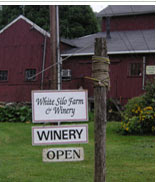 I love stories like this. The one like the “Little Winery that Could”… I am very glad to see that the fruit wine industry in Connecticut is growing fast. Now at 27 wineries and a lot of them being fruit wineries, this gives me one more reason to visit!
I love stories like this. The one like the “Little Winery that Could”… I am very glad to see that the fruit wine industry in Connecticut is growing fast. Now at 27 wineries and a lot of them being fruit wineries, this gives me one more reason to visit!
SHERMAN, Conn. – White Silo Farm and Winery isn’t very big or elaborate.
There are no 300-gallon fermentation bins, no oak barrels for aging, no fancy corking or bottling machinery.
In fact, there are no grapes. Not one single grape.
Instead, there are raspberry and blackberry bushes, black currant shrubs, cherry trees and rhubarb plants.
That’s because the small, family-owned business is a fruit winery, tucked away along the border of Connecticut and New York. And in the last five years, it has become part of a sharp growth of specialty and traditional wineries in Connecticut and across the nation.
Wineries in Connecticut have more than doubled in the last six years, from 11 to 27, according to statistics compiled by the National Association of American Wineries.
The White Silo Farm and Winery jumped on board around 2001. It is one of an estimated 50 to 100 specializing in fruit wine around the country.
The antiquated, red barn that it’s housed in overlooks nearly 90 acres of lush meadow. Visitors can often watch cows and horses grazing in the pastures.
Inside the barn, an art gallery displays work from local artists and small tables are set up toward open, barn doors, which offers a calming picture of the orchards.
The winery produces sour cherry, rhubarb and raspberry wine. Black currant and blackberry wine are also available.
The house specialty in the summer is a “Blackberry Sangria” made with dry rhubarb wine, sweet blackberry wine and orange juice. The pink mixture tastes light and refreshing, a fruity bouquet for the palate.
In the winter, visitors are encouraged to go for a dry, black currant wine, a dark, full-bodied wine that Ralph Gorman, the winery’s owner, says goes well with spaghetti and meatballs and other hearty meals.
Nestled in Litchfield Hills, the specialty winery is part of the Connecticut Wine Trail, a series of 16 wineries promoted to lure tourists into the state. Gorman says business has steadily grown since his business joined four years ago.
Though Connecticut is a long way from being a Napa Valley or Bordeaux, a visit to the specialty winery offers a quick getaway that’s unique and aesthetically appealing.
“I think every town would love to have a winery because it gives you open space,” Gorman said. “People like to see a farm in operation. It makes them feel like they are part of a bigger picture. Look at this beautiful, open space. Would you like to see a tennis court there or would you rather see raspberry fields?”
